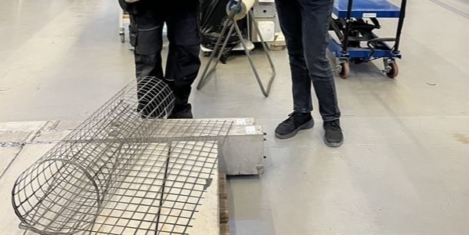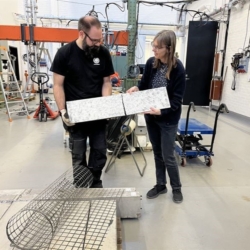To provide the best experiences, we use technologies like cookies to store and/or access device information. Consenting to these technologies will allow us to process data such as browsing behaviour or unique IDs on this site. Not consenting or withdrawing consent, may adversely affect certain features and functions.
The technical storage or access is strictly necessary for the legitimate purpose of enabling the use of a specific service explicitly requested by the subscriber or user, or for the sole purpose of carrying out the transmission of a communication over an electronic communications network.
The technical storage or access is necessary for the legitimate purpose of storing preferences that are not requested by the subscriber or user.
The technical storage or access that is used exclusively for statistical purposes.
The technical storage or access that is used exclusively for anonymous statistical purposes. Without a subpoena, voluntary compliance on the part of your Internet Service Provider, or additional records from a third party, information stored or retrieved for this purpose alone cannot usually be used to identify you.
The technical storage or access is required to create user profiles to send advertising, or to track the user on a website or across several websites for similar marketing purposes.
 CEOs who prioritise planning and organisation can find their skills make them a hindrance to their organisations when it comes to adapting to external changes, according to new research from Durham University Business School. The researchers say that this is because organised CEOs tend to be more rigid in their practices, thus making it more difficult for them to change their ways. The researchers also found that CEOs who are anxious and can get stressed easily also make it difficult for the organisation to adapt quickly. (more…)
CEOs who prioritise planning and organisation can find their skills make them a hindrance to their organisations when it comes to adapting to external changes, according to new research from Durham University Business School. The researchers say that this is because organised CEOs tend to be more rigid in their practices, thus making it more difficult for them to change their ways. The researchers also found that CEOs who are anxious and can get stressed easily also make it difficult for the organisation to adapt quickly. (more…)














 Nobody seems to be calling it The Great Resignation any more, but two-fifths (40 percent) of the UK workforce are planning to move jobs in 2024, with one in six already beginning their search as staff look to boost their pay packet, according to the latest Candidate Sentiment Survey statistics produced by recruitment firm Robert Half. The survey’s authors claim these statistics demonstrate the resilience of the labour market as more candidates look to capitalise on skills shortages to boost earnings. Those aged 18-34 are more likely to move roles than any other age group (56 percent).
Nobody seems to be calling it The Great Resignation any more, but two-fifths (40 percent) of the UK workforce are planning to move jobs in 2024, with one in six already beginning their search as staff look to boost their pay packet, according to the latest Candidate Sentiment Survey statistics produced by recruitment firm Robert Half. The survey’s authors claim these statistics demonstrate the resilience of the labour market as more candidates look to capitalise on skills shortages to boost earnings. Those aged 18-34 are more likely to move roles than any other age group (56 percent). 

















March 27, 2024
A lightbulb moment about mental health and managing change
by Jennifer Bryan • Comment, Wellbeing